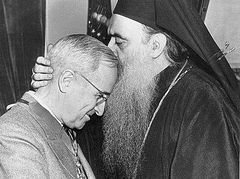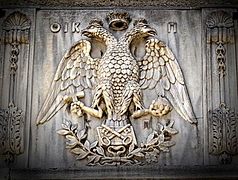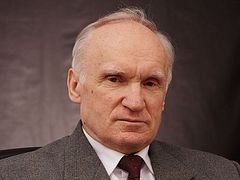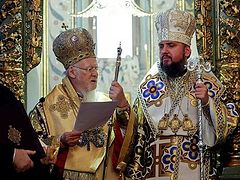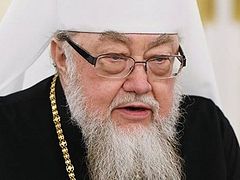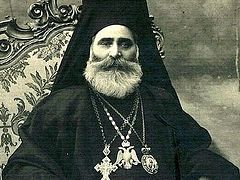The unlawful actions of the Patriarchate of Constantinople in Ukraine are certainly not the first incident of the Phanar’s non-canonical encroachment into the affairs of the Local Orthodox Churches. A clear example of an attempt to substitute an Ecumenical Council with the court of the Patriarch of Constantinople is found in the councils of the Greek-speaking Churches in 1993 and 1994. We would like to tell our readers about these little-known events.
Patriarch Diodoros
 Patriarch Diodoros I of Jerusalem In 1981, the Church of Jerusalem was headed by Patriarch Diodoros (Karivalis, 1981-2000). He began his ministry with words about how the patriarchal throne “is a throne not of majesty and glory, but martyrdom and Golgotha.”
Patriarch Diodoros I of Jerusalem In 1981, the Church of Jerusalem was headed by Patriarch Diodoros (Karivalis, 1981-2000). He began his ministry with words about how the patriarchal throne “is a throne not of majesty and glory, but martyrdom and Golgotha.”
Patriarch Diodoros embodied relentless loyalty to the Church canons and dogmas in spite of the pressure of the spirit of the times. He was known for his strict anti-ecumenist views.
At a session of its Synod on May 9, 1989, the Patriarchate of Jerusalem decided to cease theological dialogue with Anglicans and with all the non-Orthodox in general.
Patriarch Diodoros’ letter to the heads of all the Orthodox Church stated: “This step was inspired above all by the conviction of our entire Orthodox Church that it contains within itself all the fullness of truth and is the One, Holy, Catholic, and Apostolic Church and the trustworthy repository of the Divine dogmas of our immaculate faith and our Sacred Tradition, having Jesus Christ as its head. Therefore, our Orthodox Church, being absolutely assured of the rightness of its path and its saving apostolic mission on earth, has no need for theological dialogue with the non-Orthodox, who, by the way, can study our Orthodox Church themselves and, if they want, live according to it. Any further dialogue with the non-Orthodox becomes dangerous for our Orthodox Church of Jerusalem as they use this dialogue to pursue… a policy of proselytism and to continue other activities that are unacceptable for the Orthodox Church.”
Later, on October 2, 1989, preaching in the Greek Monastery of Sts. Cyprian and Justina, Patriarch Diodoros said: “This isn’t the first year they’ve been working to destroy Orthodoxy in the Holy Land. However, the Lord, having defended the Jerusalem Church for many centuries, has always saved Orthodoxy from any danger. Never in its two-thousand-year history has a single conqueror been able to master Jerusalem. Satraps, kings, and governors succeeded one another. But they are all gone, and only hundreds of Greek Orthodox monks remain—the watchful guardians of our holy heritage. Unfortunately, for decades now, not wanting to destroy the unity of the Orthodox Church, Jerusalem has nominally followed the other Churches participating in ecumenical dialogues, although ecumenism has never had any influence on us. Nevertheless, Jerusalem’s participation in these dialogues has given cause to claim that the Patriarch of Jerusalem also participates in the ecumenical movement. We note with dismay the serious abuse of these dialogues by the heretics. They confuse our faithful and try to convert them to their faith by any means necessary. They show them photographs of the Pope with our patriarchs and bishops, saying the Unia has already been achieved: ‘Don’t listen to your bishops, the Unia already exists, the Orthodox Church has united with the Roman Catholic Church.’ The word ‘Unia’ is likely used here with the meaning that ecumenists invest it with, namely—submission. Therefore, having reflected upon our responsibility before the Lord, before the Church, before our history, we decided in Divine enlightenment to cease all dialogue of the Patriarchate with non-Orthodox churches, since after many years of contact with them, no positive results have been achieved. We announced our decision to all the sister Churches and we will adhere to it as long as possible. You know that the Jerusalem Patriarchate follows the old calendar. It never changed and will not change the doctrine, canons, and dogmas of our Church. We are ready to continue laboring, and if necessary—to suffer for the sake of preserving them. The threats received by us daily and the actions of our opponents do not frighten us at all. We will remain steadfast guardians, faithful to the teachings of our Church.”
In a letter dated August 12, 1992, the Patriarch of Constantinople called on Patriarch Diodoros to participate in the development of relations with the anti-Chalcedonians. In his response to Patriarch Bartholomew’s letter, which called for participation in the discussions concerning the possibility of uniting with the Monophysites, the Patriarch of Jerusalem wrote that the Jerusalem Church has always advocated for reconciliation and the unity of all peoples, and in particular for “converting the non-Orthodox, who we, demonstrating all the spiritual riches of our holy Orthodox Church, call to accept its true and unchanging teachings, that we might all achieve the unity of faith and, having fulfilled the commandment of the Lord, be together,” and emphasized that “the holy Mother Church1 has always joyfully accepted the repentant non-Orthodox into its bosom.” Thus, Patriarch Diodoros formulated an idea and method for unity that the Holy Fathers had already taught: There can be no compromise between heresy and truth; the sole path of unification with the universal Orthodox Church is the path of repentance.
The Patriarch further emphasizes how much more reasonable it would be to use the time that is needlessly wasted on useless ecumenical dialogues on establishing mutual contacts with the sister Orthodox Churches and overcoming inter-Orthodox problems and disagreements, since dialogue with the non-Orthodox has brought no results: “What positive result has the dialogue with the Anglicans brought when they are increasing the gap between the Orthodox and Anglican churches at this point by the practice of ordaining women, and also with the Roman Catholics who widely use proselytism and continue to make incredible efforts to harm the Orthodox Church?” In conclusion, he argues that “Dialogue with the non-Orthodox cannot only not strengthen our ties, but conversely, it further divides them from the teachings of the Orthodox Church.”
Continuing his letter, the Patriarch emphasizes that as a result of all the reasons mentioned, he “does not want to take part in the dialogue with the anti-Chalcedonians, following the path of abolishing the anathemas that the Fifth, Sixth, and Seventh Ecumenical Councils placed upon the Monophysites Dioscoros, Anthimos of Trebizond, Eutyches, Severus, Peter of Apamea, and many others—those whom the anti-Chalcedonians today consider to be “great fathers” and “holy hierarchs,” and their opponents—Orthodox fathers and holy hierarchs—heretics. “We ask the question,” the Patriarch continues, “how could we reach an agreement between our holy Orthodox Church and the anti-Chalcedonians? What communion hath light with darkness? (2 Cor. 6:14). To become members of our Church,” Patriarch Diodoros believes, “heretics must repent and fully, not partially, accept the decisions of all the Ecumenical and Local Councils. Until then, the Mother Church will remain outside of this dialogue and not recognize any decisions that are in conflict with the decisions of the holy Ecumenical Councils and sacred Orthodox Tradition” (signed September 22, 1992 in Jerusalem).
This implacable position of Patriarch Diodoros led to strife between the two ancient Patriarchates. Constantinople watched askance as the Patriarchate of Jerusalem became the main spiritual center drawing anti-ecumenist forces. Jerusalem’s frequent contact with adherents of the old style and also Jerusalem’s open support for those parishes in Australia that were in conflict with their Archbishop Stylianos became a particular problem.
The July 1993 Council
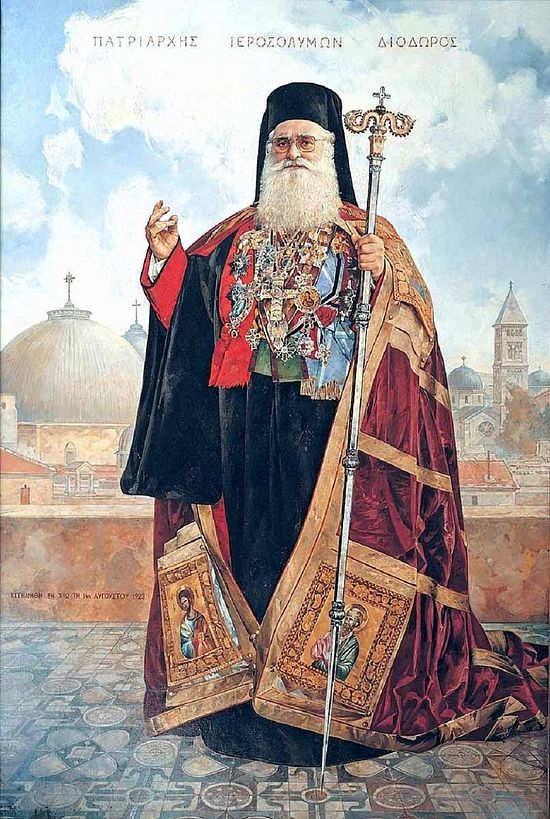 A portrait of Patriarch Diodoros by Vasily Nesterenko
A portrait of Patriarch Diodoros by Vasily Nesterenko
The culmination of the confrontation between the two Patriarchs was a council held in Istanbul on July 30-31, 1993, chaired by Patriarch Bartholomew, with Patriarch Parthenios of Alexandria, the Greek Archbishop Seraphim, a large number of bishops of the Patriarchate of Constantinople (including Iakovos of America and Stylianos of Australia), and representatives of the Cypriot Church and the Greek diaspora from the entire world.
This council, which defenders of Patriarch Diodoros consider to be a “robber council” and anti-canonical, gathered the most famous Orthodox ecumenists and, in fact, was convened with the aim of condemning Patriarch Diodoros and his actions, which the Phanar considered non-canonical. The Patriarch of Jerusalem himself did not respond to the invitation, saying that, in accordance with the sacred canons, only an Ecumenical Council can judge the Patriarch of a Local Church.
Patriarch Diodoros was convicted on many points, including interference in affairs outside his jurisdiction, “factional activity,” a plot against the Patriarchate of Constantinople, and Eucharistic communion with “schismatics and heretics.” The council decided to defrock Patriarch Diodoros and two of his archbishops: “The great council, aimed at defending unity and peace in the Church, and also to restore the authority of the holy canons that were blasphemously violated, unanimously decided to temporarily suspend Patriarch Diodoros of Jerusalem from his positions, and those close to him the Archbishops Timothy of Lydda and Hesychius of Capitolia, who, not repenting, continue to tempt and divide the Greek people both within Greece and beyond its borders.”
However, “for the sake of mercy and the love of mankind,” a qualification was made that delayed the execution of the decision: The Patriarch was given until Nativity to repent and change his position. Until then, he was “under suspension.” And the heads of all the Local Churches were called to avoid contact with him.
The council’s decision was brought to the attention of the heads of all the Orthodox Churches, causing quite a violent reaction. Nevertheless, not a single Patriarchate expressed any official indignation. There came a protest from Mt. Athos, although other large monasteries were silent. Some saw in these decisions the obvious papist tendency of the Patriarch of Constantinople, others an attempt by ecumenists to crack down on the anti-ecumenical attitude of Patriarch Diodoros that began to hinder the process of unification with the anti-Chalcedonians and Roman Catholics and to gradually create a coalition of traditionalists against the Phanar’s ecumenist course. At the same time, the ecumenical course was supported from within the Jerusalem Patriarchate itself: Following the decision of the 1993 Constantinople Council, Archbishop Damian of Mt. Sinai stopped commemorating Patriarch Diodoros.
Moreover, the council document clearly condemns the interference of Patriarch Diodoros in the jurisdiction of the Patriarchate of Constantinople in Australia, in which is clearly expressed the Phanar’s desire to keep the Greek diaspora and the diaspora of other Orthodox peoples under its control.
Not a council, but a congress
Professor of canon law at Thessaloniki University Kyriakos Kiriazopoulos emphasizes that what occurred in July 1993 cannot be called a council—“It’s only a congress or a meeting.”
The composition of the Constantinople assembly of autocephalous Churches was Greek-speaking. According to Professor Kiriazopoulos, this was certainly not accidental: The refusal to invite representatives of the other Local Churches to Istanbul was due to “the ethnophyletism of the organizers.”
The trial of Patriarch Diodoros and the hierarchs of the Jerusalem Patriarchate was also conducted with procedural violations and not in accordance with the Church’s established order.
In the context of the Phanar’s grievance against Jerusalem regarding the latter’s founding of a representation in Australia, it should be noted that not a single Ecumenical (or pan-Orthodox) Council establishes the exclusive right of the Patriarchate of Constantinople to pastor Australia. Moreover, several Local Churches have their dioceses there—in particular, the Serbian, Antiochian, Romanian, and Russian Church Abroad.
The Patriarchate of Constantinople based its “exclusive right” to pastor Australia on the 28th canon of the Fourth Ecumenical Council—the canon that (from the Phanar’s point of view) grants the Patriarchate of Constantinople the right to pastor the Orthodox diaspora throughout the whole world. Such a free reading of the 28th canon is still not acknowledged by many Local Churches.
According to the canonist Professor Kiriazopoulous, “The other Local Churches were not invited by the Patriarchate of Constantinople to participate in the assembly because the non-Greek autocephalous Churches do not recognize the Patriarchate of Constantinople’s exclusive jurisdiction over the Orthodox diaspora (including Australia), and, therefore, could support the Patriarch of Jerusalem.
Additionally, it’s obvious that the real reason for the excommunication of the ever-memorable Patriarch Diodoros was not the so-called “invasion in the jurisdiction of the Australian Archdiocese of the Patriarchate of Constantinople,” but the desire to bring Jerusalem into submission regarding its resistance to ecumenism.
The prototype for the July 1993 council (followed by several other similar councils) was, obviously, the pan-Orthodox assembly of 1923. Despite the “pan-Orthodox” epithet, the majority of the Local Churches also did not participate in it. Under Patriarch Bartholomew, congresses of Local Churches were renamed as “councils.” It should be noted that the notorious “Holy and Great Council on Crete,” also claiming “pan-Orthodox” status, was held without the participation of the Local Churches representing the majority of the Orthodox world.
Compromise. The councils of 1993 and 1994
Immediately after the council, the name of Patriarch Diodoros was stricken from the diptychs2 of the Church of Constantinople. However, a few months later, after reaching a compromise, communion was restored, and the Jerusalem hierarchs were also “restored” in their dignity. It is indicative that this happened at similar gatherings of the Greek-language Churches—the second on December 14, 1993, and the third on April 21, 1994. Both gatherings were held with the same composition in Istanbul.

